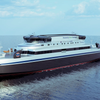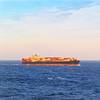Senators Murray, Cantwell Introduce American Port Legislation
- Senate bill designed level the playing field for American ports competing for cargo, boost investments in port infrastructure and maintenance
- Legislation replaces the Harbor Maintenance Tax
U.S. Senators Patty Murray and Maria Cantwell introduced today The Maritime Goods Movement Act for the 21st Century, new legislation that would support the American trade economy and significantly strengthen American ports. The legislation would replace the outdated Harbor Maintenance Tax (HMT), which is designed to fund the operation and maintenance of American ports, but currently incentivizes shippers to bypass American ports and move U.S. bound goods through Canada and Mexico instead. With nearly 27 percent of international container cargo potentially at risk of moving to Canada from four West Coast ports, this trend could result in significant job losses. This bill replaces the HMT with the Maritime Goods Movement User Fee, which would discourage shippers from diverting American-bound goods through Canadian or Mexican ports simply to avoid American taxes that fund vital infrastructure investments and keep American ports competitive in the global economy.
The Maritime Goods Movement Act for the 21st Century would also dramatically improve support for infrastructure investments at American ports by ensuring that all of the proceeds from the user fee are spent annually for port operation and maintenance. Currently, only half of the tax revenue collected through the HMT each year is actually spent on port upkeep, even though American ports are in desperate need of more maintenance investment. This bill would enable full investment of fee collections, nearly doubling the amount of funds available to American ports each year. These investments support American jobs and help the economy thrive.
The legislation would also set aside portions of the user fee to support critical low-use ports and to create a competitive grant program to improve the U.S. intermodal transportation system, which helps goods reach their intended destinations quickly and efficiently.
The Maritime Goods Movement Act has already received strong support from large and small ports in Washington state, including the Ports of Seattle, Tacoma, Grays Harbor, Everett, Longview, and Vancouver.
Below is a joint statement for the record submitted by Senators Murray and Cantwell to mark the legislation’s introduction:
“Mr. President, we rise to discuss legislation we are introducing today to strengthen our maritime economy and protect American jobs.
“Over the past decade, we have seen increasing competition for the market share of U.S.-bound maritime goods from ports beyond our border to the north and to the south. In fact, among the 25 largest North American ports, the fastest growing in 2012 were the Port of Prince Rupert in Canada and the Port of Lazaro Cardenas in Mexico. Instead of U.S.-bound cargo creating economic growth here at home by entering at U.S. ports, we are witnessing it being diverted through Canadian and Mexican ports. This loss of cargo shipments leads to decreased activity and capacity at American ports. In our home state alone, more than 200,000 jobs are tied to the activities at the Ports of Seattle and Tacoma. With nearly 27 percent of international container cargo potentially at risk of moving to Canada from four West Coast ports, this trend could result in significant job losses.
“One of the main reasons for cargo diversion is the Harbor Maintenance Tax (HMT). The HMT is a levy on imports designed to fund the operation and maintenance of America’s large and small ports, which drives job creation and strengthens America’s trade economy. Unfortunately, shippers have been able to avoid the Harbor Maintenance Tax by shipping goods through ports in Canada and Mexico and then transporting those goods into the United States via truck and rail. This growing cargo diversion reduces the funds available to keep our ports in operating condition.
“The loss of revenue from cargo diversion is only part of the problem. Equally concerning is the fact that only half of the tax revenue collected is being spent, even though ports across the country are in desperate need of additional maintenance funding. As of 2011, the balance of the Harbor Maintenance Trust Fund (HMTF), which is funded by the HMT, had a surplus of more than $6.4 billion, and it continues to grow. Furthermore, of the funds allocated through the HMTF, the balance is rarely spent on operations and maintenance at West Coast ports, where a significant amount of the tax revenue is generated. Our two largest ports in Washington – Seattle and Tacoma – generate, on average, close to seven percent of the funding for the HMTF, but each received just over a penny for every dollar collected from shippers who pay the HMT in Seattle and Tacoma. We believe that we must work to address the issue of cargo diversion as well as ensure that the funds collected are allocated fully and more equitably to meet our nationwide harbor and waterway needs.
“To remain competitive in an international marketplace, we need a long-term plan to grow and support infrastructure development, and reforming the Harbor Maintenance Tax is a commonsense place to start. That’s why we are proud to introduce the Maritime Goods Movement Act for the 21st Century. The legislation addresses threats to America’s maritime economy by:
· Repealing the Harbor Maintenance Tax and replacing it with the Maritime Goods Movement User Fee, the proceeds of which would be fully available to Congress to provide for port operation and maintenance. This would nearly double the amount of funds available for American ports, which will help our economy thrive.
· Ensuring that shippers cannot avoid the Maritime Goods Movement User Fee by using ports in Canada and Mexico.
· Setting aside a portion of the user fee for critical low-use ports that are at a competitive disadvantage for federal funding compared to large ports.
· Creating a competitive grant program using a percentage of the proceeds of the user fee to help make improvements to the intermodal transportation system of the United States so that goods can more efficiently reach their intended destinations.
“Mr. President, the HMT simply is not being collected or spent in a way that ensures American ports can continue to compete on a level playing field. Our legislation works to address these inequalities and enhance our economic competitiveness abroad while supporting good jobs here in the United States.”












